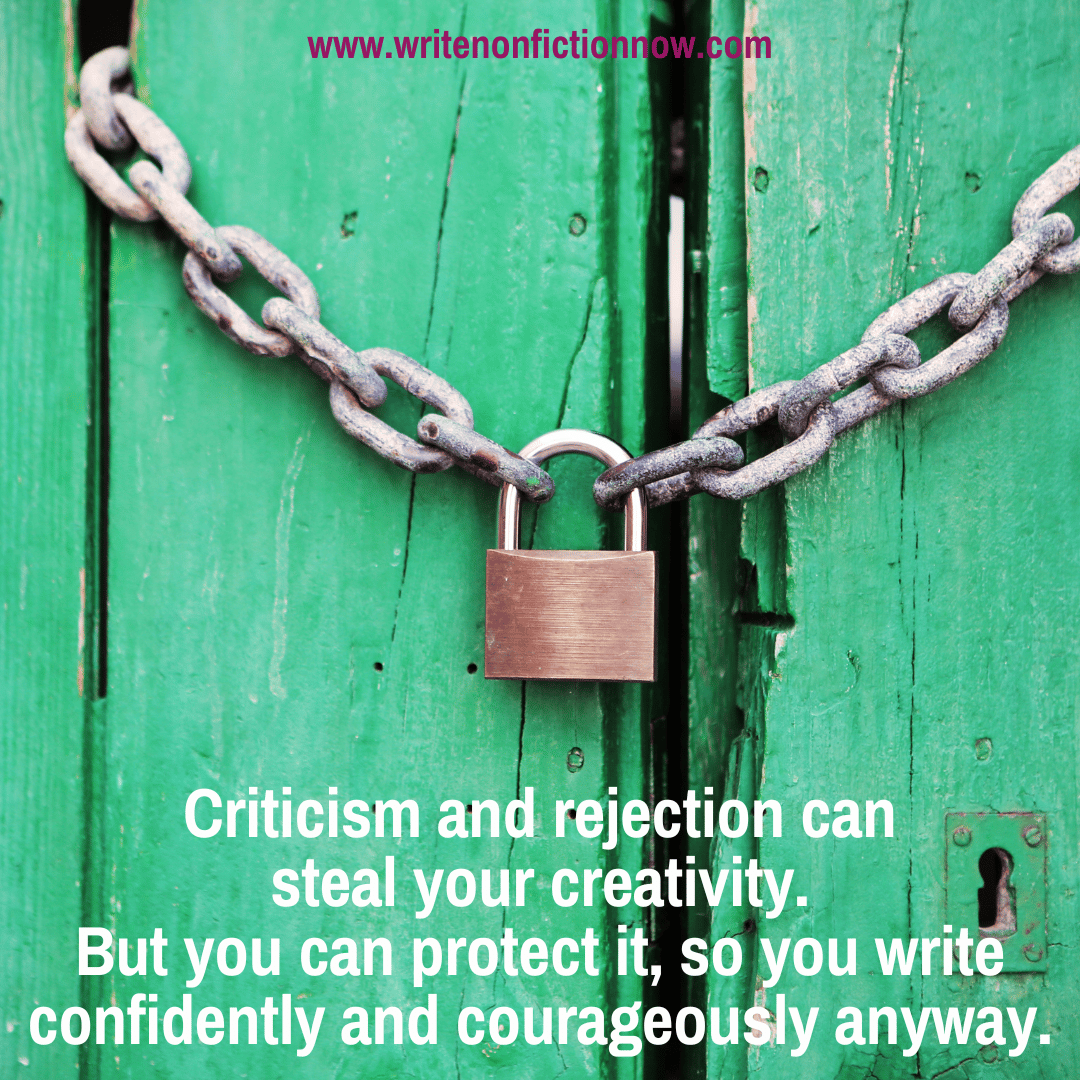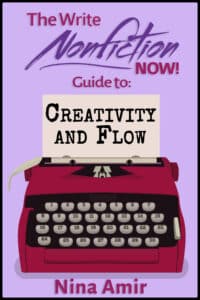 As long as there are writers, there will be critics and rejection. They are part and parcel of the writing life…if you want to share your work with the world. Yet, fear of criticism and rejection are the two most prevalent reasons writers don’t write and publish their work. In fact, they can steal your creativity—if you let them.
As long as there are writers, there will be critics and rejection. They are part and parcel of the writing life…if you want to share your work with the world. Yet, fear of criticism and rejection are the two most prevalent reasons writers don’t write and publish their work. In fact, they can steal your creativity—if you let them.
It’s true: you and your work may be criticized and encounter rejection in your efforts to be a successful writer and author. So how can you move forward despite your fear?
I’ve pondered the solution to this challenge for many years. My clients and members of the Nonfiction Writers’ University frequently ask me for tips on protecting their creativity from critics and inevitable rejection.
Critics and Rejection can Kill Creativity
As a writer, I also fear criticism and rejection—even more so in the last eight years. Early in my career, I was better able to keep them at bay. I had high confidence in my writing ability and believed 100% that I could and would find an agent and publisher. More recently, I allowed criticism and rejection to impact my confidence and belief, which subsequently affected my creativity.
As my confidence and courage waned, I stopped working on book projects and only wrote and published blog posts and a few magazine articles. Plus, my creative juices seemed dried up for the first time in my life.
As I’ve addressed my worries and creative blocks, I discovered five essential tools for protecting creativity from criticism and rejection.
1. Don’t give meaning to what others say or do.
Humans are meaning-making machines. We interpret everything that happens to us. Therefore, when someone criticizes us or our work, we make it mean something about us. For instance, we decide we are not good writers or our ideas are not creative enough.
Of course, it’s essential to be able to receive constructive criticism. That’s what makes us better writers and improves our projects. But you must develop a thick skin so you can use criticism that way.
In other cases, consider reinterpreting what you are told. Often critics’ words say more about them than about us or our work. And rejection can happen for many reasons. So why not assume you sent your work to the wrong person and then send it to the right one?
2. Get positive support and feedback.
Find people who will provide you with positive support and feedback. That doesn’t mean you don’t want constructive criticism if they can offer it. But sometimes writers need cheerleaders or coaches to keep them positive and creative.
You might consider gathering other writers or creatives around you for a monthly get-together. This does not need to involve feedback on your work, but it could. Or just have lunch with a creative friend.
Or hire a coach. This does not need to be a book, writing, or author coach, but it can be. It does need to be someone who can help keep your mindset positive and forward-looking, as well as help you develop a writing habit and the courage to publish. Transformational coach or a Certified High Performance Coach will do the trick. Such coaches are focused on your personal growth and development—and, in some cases, your spiritual growth.
3. Retain your power.
When you allow critics or those who reject your work to impact your feelings, self-esteem, confidence, or outlook, you give them power over you. If you want to handle criticism and rejection more easily, take back your power.
 Remember: No one can make you feel anything. You choose how you feel. Typically, this is a reaction. But you can take a deep breath and decide to respond. That’s powerful.
Remember: No one can make you feel anything. You choose how you feel. Typically, this is a reaction. But you can take a deep breath and decide to respond. That’s powerful.
You also have the power to not listen…walk away…continue writing anyway…submit to someone else. Or go take a hot bath, walk in nature, or a nap and then return to your computer and keep writing.
You do not have to let criticism or rejection impact your creativity. If you do, that’s your choice. And you can make a new choice. You have the power to do so.
4. Choose to be a confident and courageous writer.
Avoiding unpleasantness by not believing in yourself and allowing fear to keep you stuck is easy. But if you keep doing what’s easy, where will you be in six months or a year? And if you confidently, courageously write, submit, and publish your work? What then?
You also can choose to be confident and courageous despite the critics and rejection. Believe in yourself! Take bold action!
Be a courageous and confident writer. Adopt that identity. Then you’ll find it easy to continue writing. And your creativity level will rise exponentially.
5. Walk away from situations and people that cause you to doubt yourself.
Sometimes writers and authors continue relationships with people because they think they must or should—that it will be good for their careers. And they do this even if the connections are toxic. This is a surefire way to destroy your creativity, confidence, and courage. (Believe me…I know!)
But you can walk away from situations and people that cause you to doubt yourself. And nothing horrible will happen. In fact, doing creates opportunities for you to find new situations and people who will bolster your confidence and creativity.
Protect Your Creativity
The best thing you can do for your creativity is to put a fence around it. Protect it from doubters, critics, and those who say you are wasting your time.
Yes, writers will always have critics and face rejection to some extent. However, that doesn’t mean you have to allow this fact to stomp out your creativity or cause you to stop writing or publishing.
Protect your creativity, and then create anyway. Write despite the possibility of criticism and rejection.
How do you protect your creativity from critics and rejection? Tell me in a comment below, and please share this post with a friend and on social media.
If you are looking for a coach, consider joining either the Nonfiction Writers’ University or the Inspired Creator Community. If you are uncertain which program will support you most, let’s chat. Schedule a brief session here.
 Would you like to write and publish nonfiction work, like articles, blog posts, books, or reports…and become a successful author? Join the Nonfiction Writers’ University. Get the basic education you need and the group Author Coaching to help you succeed as a nonfiction writer.
Would you like to write and publish nonfiction work, like articles, blog posts, books, or reports…and become a successful author? Join the Nonfiction Writers’ University. Get the basic education you need and the group Author Coaching to help you succeed as a nonfiction writer.
Enjoy a 30-day trial membership for only $1. If you’ve felt the desire to get coached and be supported as you pursue authorship, this program is for you. Participate in monthly group Author Coaching sessions and gain access to an extensive archive of writing and publishing resources.
Elizabeth Hoffmann says
I once responded to a negative remark, “What you say may be true, but it’s not true just because you say it.” That idea is a starting point for considering how I want to use (or refuse) other people’s comments.
Nina Amir says
I love this!